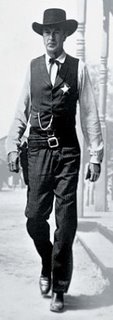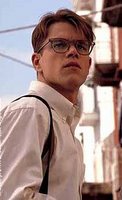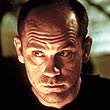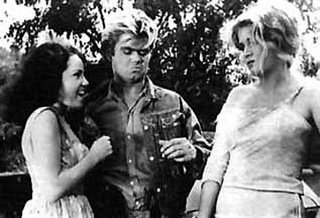 I think Patricia Highsmith's Hitchcockian villain, Tom Ripley, may have been circulating in the back of my head for a while--but that may have more to do with Ripley's slick/nervous pathology, sometimes hepped up and obvious, sometimes boyish and unassuming, as he wended his charming/nasty way. That covers a lot of ground, from Arch Hall Jr.'s Charlie Tibbs in The Sadist (1963) to Robert Walker's Bruno Anthony in Strangers on a Train (1951) (which makes sense, since it too is based on a Highsmith book)--not to mention every smooth operator to have bamboozled, grifted, and fleeced (then sometimes murdered) a variety of little old ladies, sweet young things, and assorted would-be partners and pals, on TV and at the movies, from Perry Mason to Law and Order. I do know I didn't read her books until seeing Matt Damon take a crack at the boy in 1999's The Talented Mr. Ripley. I think I remember some reviewers/fans of the books not entirely happy with Damon, but he was a good choice, a hybrid of the aforementioned Bruno Anthony and Farley Granger's sap in Hitchcock's movie, a halting fellow who manages decisive action when he really wants to--and out go the lights.
I think Patricia Highsmith's Hitchcockian villain, Tom Ripley, may have been circulating in the back of my head for a while--but that may have more to do with Ripley's slick/nervous pathology, sometimes hepped up and obvious, sometimes boyish and unassuming, as he wended his charming/nasty way. That covers a lot of ground, from Arch Hall Jr.'s Charlie Tibbs in The Sadist (1963) to Robert Walker's Bruno Anthony in Strangers on a Train (1951) (which makes sense, since it too is based on a Highsmith book)--not to mention every smooth operator to have bamboozled, grifted, and fleeced (then sometimes murdered) a variety of little old ladies, sweet young things, and assorted would-be partners and pals, on TV and at the movies, from Perry Mason to Law and Order. I do know I didn't read her books until seeing Matt Damon take a crack at the boy in 1999's The Talented Mr. Ripley. I think I remember some reviewers/fans of the books not entirely happy with Damon, but he was a good choice, a hybrid of the aforementioned Bruno Anthony and Farley Granger's sap in Hitchcock's movie, a halting fellow who manages decisive action when he really wants to--and out go the lights. But Tom Ripley is such a cipher, an empty vessel always needing to fill itself, that you can build him with many mansions--or haunted houses. So I was looking forward to Rene Clement's take in 1960's Plein soleil. The English title is Purple Noon, but "high noon" is the closer translation, which conjures up an association with the Western's satisfying resolution of the conflict between Good and Evil--and even though Gary Cooper's Will Kane is a reluctant keeper of the peace, pushed by pride, 1952's High Noon asserts the possibility of and need for such gestures, if only for a split-second--the time it takes to draw and fire; but of course that gesture is thwarted by Tom Ripley, who is pleasant and ruthless, a charming Creature whose smile is as soft as its claws are ragged, and whose own "high noon" is as much a matter of circumstance as intention. So a fair fight on Main Street is out of the question. While Clement does not remain entirely true to the novel--as Roger Ebert not-so-subtly puts it, "Purple Noon ends as it does only because Clement doesn't have Highsmith's iron nerve"--he recognizes that this is Tom's entree to opportunistic murder, and is bound to make mistakes, but is so consumed with himself that he never sees the noon hour approach.
But Tom Ripley is such a cipher, an empty vessel always needing to fill itself, that you can build him with many mansions--or haunted houses. So I was looking forward to Rene Clement's take in 1960's Plein soleil. The English title is Purple Noon, but "high noon" is the closer translation, which conjures up an association with the Western's satisfying resolution of the conflict between Good and Evil--and even though Gary Cooper's Will Kane is a reluctant keeper of the peace, pushed by pride, 1952's High Noon asserts the possibility of and need for such gestures, if only for a split-second--the time it takes to draw and fire; but of course that gesture is thwarted by Tom Ripley, who is pleasant and ruthless, a charming Creature whose smile is as soft as its claws are ragged, and whose own "high noon" is as much a matter of circumstance as intention. So a fair fight on Main Street is out of the question. While Clement does not remain entirely true to the novel--as Roger Ebert not-so-subtly puts it, "Purple Noon ends as it does only because Clement doesn't have Highsmith's iron nerve"--he recognizes that this is Tom's entree to opportunistic murder, and is bound to make mistakes, but is so consumed with himself that he never sees the noon hour approach. In the film, Ripley's error is not one in judgment, but a mere accident, literally as slim as a length of rope--shades of Hitchcock once again--and this makes its own kind of sense, especially given the film's mise-en-scene, a sun-washed, sparkly Mediterranean tour, leisurely, picturesque, baked by an inviting sun and buoyed by a disturbingly serene and cheerful Nino Rota score, as tall and cool as a poolside drink. It would seem in such surroundings that nothing but thoughtless chance could ruin things. In her novels, Highsmith enlists us into Ripley's endeavors; we are alarmed to find ourselves rooting for him. Alain Delon, though, invites scant allegiance--but not because he is overtly villainous; on the contrary, it is his flat good looks that warn us, his beautiful, unreadable eyes, never menacing, but never sympathetic. Ripley does not plan ahead, but calculates quickly as the need arises--well, as his needs arise. In Clement's film, it seems he does need blind accident to undo Delon's Ripley. And while I'd like to see Matt Damon play Tom again, I want him to try it in Clement's sunny climes, where sailboats and Vespas, sidewalk cafes and charming feste play the chorus to the dull thuds and final groans that mark Ripley's progress.
In the film, Ripley's error is not one in judgment, but a mere accident, literally as slim as a length of rope--shades of Hitchcock once again--and this makes its own kind of sense, especially given the film's mise-en-scene, a sun-washed, sparkly Mediterranean tour, leisurely, picturesque, baked by an inviting sun and buoyed by a disturbingly serene and cheerful Nino Rota score, as tall and cool as a poolside drink. It would seem in such surroundings that nothing but thoughtless chance could ruin things. In her novels, Highsmith enlists us into Ripley's endeavors; we are alarmed to find ourselves rooting for him. Alain Delon, though, invites scant allegiance--but not because he is overtly villainous; on the contrary, it is his flat good looks that warn us, his beautiful, unreadable eyes, never menacing, but never sympathetic. Ripley does not plan ahead, but calculates quickly as the need arises--well, as his needs arise. In Clement's film, it seems he does need blind accident to undo Delon's Ripley. And while I'd like to see Matt Damon play Tom again, I want him to try it in Clement's sunny climes, where sailboats and Vespas, sidewalk cafes and charming feste play the chorus to the dull thuds and final groans that mark Ripley's progress. NOTE: Im leaving John Malkovich's Ripley out of the discussion for now. This is Ripley all grown up, and Malkovich addresses that possibility with appalling perfection. The relentless Ripley's Game (2002) deserves its own post. And I'm simply too tired right now even to consider Wim Wenders' The American Friend (1977). Basta!
NOTE: Im leaving John Malkovich's Ripley out of the discussion for now. This is Ripley all grown up, and Malkovich addresses that possibility with appalling perfection. The relentless Ripley's Game (2002) deserves its own post. And I'm simply too tired right now even to consider Wim Wenders' The American Friend (1977). Basta!BELOW: Robert Walker and Arch Hall, Jr. show how it's done.


1 comment:
Bravo! I've been a fan of Highsmith and the Riply novels for some time, but seldom come across others who've had a similar problem with Mignella's casting of Tom. The Clement version – Noon has an egde over ither versions, IMHO, because the casting is closer to the books.
Post a Comment